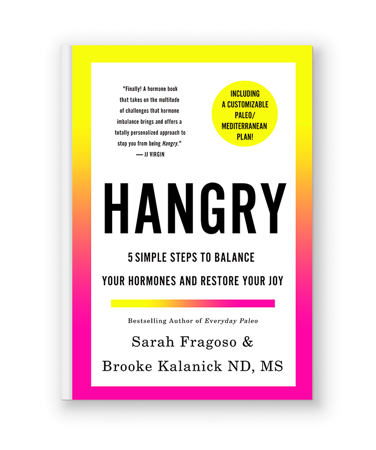
Nothing irritates me more than seeing a blog headline or ad with the words:“The Secret Hormone That’s Making You Fat!!” Or the hot new hormone you need to get all focused on right now!
It’s absurd that any one hormone is to blame for weight gain, fatigue or your health. And it’s silly to think you can focus all your eating, exercising and supplementing efforts on one metabolic messenger and not disrupt another. You are hormonal! I don’t mean that PMS cranky pants that you may have been last week, I mean that you have a whole lot of hormones doing a whole lot of things in your body right now.
Hormones are truly a symphony playing in harmony with each other.
The action of one tempers the action of another. The action of that one shuts down another when it’s too high, and raises yet another when it’s too low. When one is off balance, it’s only a matter of time before two or three more get out of whack as well.
Within your orchestra, there are several parts written just for fat loss (or fat gain) – and there are many instruments playing this tune. Together they affect how well you burn fat, how easily you store fat, what you crave and how you perceive hunger. They ALL matter and if you struggle dropping fat, then there is more than one out of tune in you.
Lucky for all of us, the idea that hormones matter instead of the classic “just eat this many calories” is catching on in nutrition.
If you’ve looked into it though, you’ve probably heard any or all of the following: Carbs make you fat. You need carbs or your brain dies. Cortisol (aka stress) makes you fat so eat every 2 hours. Don’t eat every two hours or you’ll secrete insulin all day and get fat. Try fasting! Stop it with the frequent meals cuz it’s all about leptin! Neuropeptide Y is they key!! And the somewhat newer kid on the block: take some magnesium to balance adiponectin and you’ll get skinny
There is some truth in all of these statements. But if you know ALL of these hormones matter, what should you do with this confusing mess when the advice to balance one is the EXACT opposite of what they tell you to do for the other!??! Fortunately, you don’t need to do a fellowship in endocrinology to get a handle on things.
Get you FREE copy of my Guide To Lab Testing & Your Hormones
This guide covers hormonal testing and thyroid patterns and will show you how to suss out the Hormonal Dealbreakers of inflammation, anemia and blood sugar problems.
Get Your Free Lab Guide HereThere’s only a couple of hormones that you really need to worry about. Yes, some of you have issues (i.e. hypothyroidism, menopause, etc.) that are best sorted out with the help of a qualified doc (like me!) but even you all can benefit from understanding just two key metabolic hormones.
Focus on insulin and cortisol – the two key regulators of fat and sugar storage and burning.
Here’s why:
You have the most control over these two hormones with diet and lifestyle. They are such key players that balancing out these two will set many other hormones straight (at least most of the way!) You are getting signals all day, from your own body, telling you exactly what to do to balance these master hormones.
If you don’t balance these out first, and focus on a peripheral fat loss influencer, like estrogen, you’ll never get that secondary hormone balanced anyway. Insulin and cortisol play a tug of war with each other. Cortisol aims to raise your blood sugar any time you need extra energy or there is no food around, and insulin lowers your blood sugar. This back and forth, see saw game is going on all day. The more you can keep them level, the less extreme highs of either of them, the better.
If you simply want to know how to fix this and don’t care so much about the details, scroll to the bottom of the article and learn what to do.
For the rest of you, here’s a brief overview of the roles insulin and cortisol play in fat storage:
Insulin
Secreted in varying amounts when you eat carbohydrates and proteins, insulin is an anabolic hormone. It builds you up, it stores sugar, fat and even vitamins for later use. If managed correctly, it can build up your lean muscle tissue and if managed incorrectly, it will pack on the fat.
Insulin’s main job is to: lower your blood sugar. The amount of insulin secreted depends on how high your blood sugar is AND how well your body heeds insulin’s message.
A meal higher in starch/sugar type (bread, pasta, root veggies like sweet potato, all grains and of course, sugar) carbohydrates will cause a bigger insulin surge than a meal higher in protein and fiber. A meal higher in fiber (think veggies like greens) will cause your blood sugar to rise slower, thus less of an insulin surge all at once.
A meal higher in protein will still cause an insulin release but because it also triggers another hormone: glucagon, you get less of a spike and less of the high insulin consequences (meaning less fat storage).
In the most simple terms, the more insulin around, the more fat storage you’ll have.
Therefore a protein+veggie meal is the most insulin balanced meal you can choose. Throw a little healthy fat like olive oil and avocado and you’ve got insulin right where you want it. Beyond that, starchy carb and sugar (i.e. fruit) intake is the variable that is unique to each of you.
When Insulin Goes Bad
When all’s well in the insulin department, muscle, fat and liver cells are receptive or “sensitive” to insulin’s message and you are insulin sensitive. Your cells heed the metabolic message insulin sends with ease.
When you are insulin resistant, your cells aren’t able to utilize the message, so your body secretes more and more insulin to get its message across. Left unchecked, it eventually takes a lot of insulin to keep your blood sugar from being too high. In this case, the message to your body is “store, baby, store”– fat, that is.
Some of you, like me, are more prone to insulin resistance. If you have a very difficult time shedding fat, have PCOS, diabetes or pre-diabetes, acne, erratic cycles or family history of diabetes, you are likely to have a weak link in your insulin control. It’s not hopeless, but means you have to learn to improve your insulin sensitivity – and don’t wait until you get a diagnosis of diabetes! Start now.
Cortisol
Cortisol is secreted in response to any stress: cold, fasting, starvation, loss of blood, hemorrhage, surgery, infection, pain, inflammation, lack of sleep, emotional trauma, and intense exercise.
When you don’t manage cortisol well, you start to store more fat, particularly when lots of insulin is around and particularly around the middle. When you are under continual, high stress, your waistline expands, you might be achy and sore all over, have difficulty sleeping, don’t tolerate exercise well, and notice a puffy look to your face.
Cortisol is a catabolic hormone (opposite of insulin’s anabolic, build ‘em up nature), it breaks you down. It breaks down stored sugar and fat (it can even breakdown protein – meaning muscle and your gut) to keep you going when your blood sugar needs a boost.
The problem is not so much high cortisol itself, it more accurately is the combo of insulin and cortisol, that packs on the fat, especially the muffin top. Whenever blood sugar rises, whether because of what you’ve eaten or because you are under stress (wherein cortisol raises your blood sugar), you have a subsequent rise in insulin. (Your cortisol just shot up a bit reading that, didn’t it?)
Cortisol has a really bad rap as a “fattening hormone”. Before blaming it for all your fat troubles, it’s important to remember two things:
- One, you’d die without cortisol. It keeps your blood sugar up between meals and while you sleep, is crucial to keep inflammation down, and even a little of it is necessary to keep organs – such as your intestinal lining – healthy. When it’s too low it’s just as bad as when it’s too high. When it’s low you have a whole host of low blood sugar symptoms such as: difficulty staying asleep, low morning energy, low morning appetite, feeling irritable/shaky/lightheaded if you miss a meal, poor memory, etc. This mess can lead to insulin issues just as high cortisol can.
- Secondly, some cortisol is necessary to burn fat (it triggers your stored-fat-releasing enzyme, hormone sensitive lipase). This is in part why short bursts of intense exercise are better for fat loss. Cortisol in short bursts, such as intense weight lifting or sprinting, actually HELPS YOU BURN FAT. Provided you aren’t chronically putting out high amounts of cortisol and insulin isn’t elevated at the same time (meaning: don’t carb load before a workout if you want to burn fat).
Order Hangry and get some AMAZING bonuses right now!
If you’ve ever felt like a Hangry B*tch and are ready to balance your hormones and restore your joy in just 5 simple steps then Hangry is for you!
GET YOUR BONUSES NOW
Cortisol+Insulin
The high cortisol+high insulin combo comes about when you’re under a lot of stress and over-taxing your insulin sensitivity.
This can of course be the classic frenzied stress-aholic living on coffee, soda, simple carbs and junkfood – but it can also be the girl doing too many spin classes and eating a “healthy” diet with too much quinoa and brown rice. When you think of stress, the standard mental/emotional stuff comes to mind: a fight with your boyfriend, a nasty boss, worrying over money or anything else, running late, but stress also can come from:
Over-exercising (particularly long duration cardio like running, spinning, etc.or not taking enough recovery time)
- Lack of restful sleep
- Inflammation
- chronic injuries
- and the biggie: food intolerances (i.e. gluten, soy, dairy, etc.)
- Blood sugar swings – skipping meals, overeating (particularly carbs, remember to find your UCT)
How To Obey Two Masters
The take away here is that all of your hormones need to be in balance for a BETTER body, but getting off in the weeds and trying to manage your entire endocrine, nervous and immune system is a ridiculous strategy for you. As is focusing on just one hormone touted as the holy grail of fat loss (at least this week….).
Take control of just these two: insulin and cortisol, and you’ll have a more simple approach to hormonal balance that you can make sense of – and do something about.
Here’s how:
Symptoms of High Cortisol Include:
Can’t fall asleep at night. Puffy look, all over but can usually be seen in the face, intolerance to exercise, difficulty recovering from workouts and healing from injuries, high body fat, particularly around the middle.
Balance Cortisol With: Herbs such as: rhodiola, Holy Basil (Tulsi), phosphatidyl serine, and turmeric (here’s my fav adrenal product)
*note the above are all safe for autommune/Hashimoto’s as they don’t shift immune balance (Th1/Th2)
*Phosphatidyl serine is best used if you know your cortisol is high as it helps coordinate the release of cortisol from your adrenal glands by working in your hypothalamus (brain). High doses are needed, 400mg several times per day. Because this dose when taken orally can cause some unwanted symptoms like joint pain, I prefer this topical cream.
Symptoms of High Insulin & Insulin Resistance:
Sleepy after eating (i.e. want to take a nap or grab some Starbucks) Cravings for sweets after eating( and eating them usually doesn’t relieve the craving) You are full but just want to keep eating (You’ve probably thought, “Why am I still eating, I’m full”?) If you have acne, PCOS or pre-diabetes then you have some degree of insulin resistance.
Balance Insulin With: Nutrients to improve insulin sensitivity: chromium, vanadium, alpha lipoic acid, magnesium, B vitamins, omega 3 fats. Sans the omega 3s, all of these nutrients are found in my blood sugar balancing multi.
*Note on Omega 3s: I prefer fish oil over flax as many, especially those prone to insulin resistance, can’t convert the omega 3s in flax to the version of omega 3 that actually helps: EPA and DHA. EPA and DHA are what are already found in fish oil, so skip the conversion issue and go fish oil!
Find your Unique Carb Tolerance (more info on finding this magic formula here) so that you can tailor your carb intake to match your insulin capacity. This is crucial for fat loss!
Avoid food sensitivities. When you eat a food that causes inflammation for you, it seriously taxes your ability to regulate your blood sugar. Gluten is one of the worst culprits that has an even bigger problem: it’s super starch amylopectin which causes a huge insulin surge. More on gluten here, here and here.
Whew! That was a long blog, thanks for sticking with me. But like I said, master these two and your fat loss fires will be stoked and all those other hormones will start to sort them out.
Still struggling? Contact me! drbrooke@betterbydrbrooke.com
Order Hangry and get some AMAZING bonuses right now!
If you’ve ever felt like a Hangry B*tch and are ready to balance your hormones and restore your joy in just 5 simple steps then Hangry is for you!
GET YOUR BONUSES NOW



